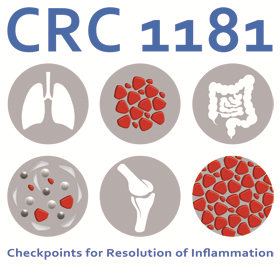Anti-inflammatory drugs protect against Covid-19
Patients with immune diseases taking cytokine inhibitors show no signs of coronavirus infection
Covid-19 leads to a similar excessive immune reaction in the lungs as in organs affected by rheumatism, psoriasis or intestinal inflammation. A research team at FAU has now shown in a study that drugs used in the treatment of autoimmune diseases, so-called cytokine inhibitors, inhibit Covid-19 before the coronavirus can spread in the body.
Covid-19 triggers an excessive immune response, which leads to inflammation of the pulmonary vesicles, which in turn seriously affects gas exchange in the lungs. This inflammatory reaction is triggered by messenger substances (cytokines) produced by the lung and immune cells. Several of these messenger substances, such as tumour necrosis factor alpha (TNFα), interleukin-6 and interleukin-1, also have a significant role in diseases such as rheumatism, intestinal inflammation and psoriasis and are already treated today with special drugs known as cytokine inhibitors.
Prof. Dr. Georg Schett, Chair of Internal Medicine III, Prof. Dr. Michael Sticherling, Chair of Skin and Veneral Diseases, and Prof. Dr. Markus Neurath, Chair of Internal Medicine I and Speaker of the German Centre for Immunotherapy (DZI) at Universitätsklinikum Erlangen, have examined 1,000 subjects for antibodies against Covid-19 in the past three weeks. Among the subjects were patients with immune diseases taking cytokine inhibitors and medical personnel in the control group. The result: While approximately 4 percent of the control group employed in medicine and 2 percent of the control group without a medical occupation had antibodies against the coronavirus, none of the patients with rheumatism, intestinal inflammation or psoriasis had antibodies against coronavirus in the blood. ‘It seems that the cytokine inhibitors restrict infection with the SARS-COV-2 virus from the outset, so that no antibodies are formed,’ says Prof. Schett.
People with rheumatism, intestinal inflammation or psoriasis should therefore not be regarded as a risk group for COVID-19, but should actually be protected from the disease due to their therapy. Cytokine inhibitors used in immune diseases are currently being tested for the treatment of patients with COVID-19. The similarities between the molecular mechanisms of COVID-19 and chronic inflammation have already been described by the research team in the journal Nature Review Immunology: https://doi.org/10.1038/s41577-020-0312-7.
Further information:
Internal Medicine III
+49 9131 85-39109
georg.schett@fau.de

